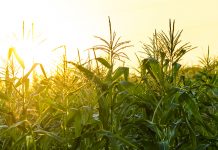Jim Lane

Compared to prior generations, CodeXyme 4 and CodeXyme 4X significantly reduce the cost of cellulosic sugar production for biofuels and bio‐based chemicals.
In California, Codexis (CDXS) announced the launch of CodeXyme 4 and CodeXyme 4X cellulase enzyme packages for use in producing cellulosic sugar for production of biofuels and bio‐based chemicals.
Codexis’ latest generation of advanced cellulase enzymes, CodeXyme 4 for dilute acid pretreatments and CodeXyme 4X for hydrothermal pretreatments, exhibits excellent performance, converting up to 85% of available fermentable sugars at high biomass and low enzyme loads. Combined with high strain productivity using the CodeXporter® enzyme production system, this allows for a cost‐in‐use that the company believes will be among the lowest available once in full‐scale commercial production.
CodeXyme 4 increases performance 10‐20% over Codexis’ last generation product, CodeXyme 3, measured by the amount of glucan converted into C6 fermentable sugar. For pre‐treatments with unconverted xylan, CodeXyme 4X maintains the same high C6 sugar activity while having additional C5 sugar conversion.
“After four years of development using our CodeEvolver directed evolution technology platform, we are proud to announce that our high‐performing CodeXyme cellulases are broadly available for the first time,” said John Nicols, Chief Executive Officer of Codexis. “CodeXyme has been tested against other commercially‐available cellulases and we have found the performance to be equal or better than alternative enzymes, across various feedstocks and pre‐treatment types. We expect CodeXyme cellulase to deliver significant cost savings and yield improvements for industrial‐scale production of cellulosic sugars.”
What does it mean?
Well, think a lot of things, but above all, think them in Portuguese.
This advance from Codexis while having applications across a broad set of applications and geographies, has “Brazil” written all over it, and Codexis execs, speaking about the technology at World Biofuels Markets, confirmed that Brazil was on the radar.
Why? Iogen has parted with its other businesses and is laser-focused on commercializing its cellulosic ethanol technology with Raizen in Brazil with no official enzyme partner announced to date. Not to mention that Raizen is the largest single shareholder in Codexis. Not to mention all that lovely bagasse. Not to mention that Raizen has been talking up their interest in cellulosic ethanol.

Leading Enzyme Performance?
During the past several months, CodeXyme cellulase has been tested on a variety of feedstocks and pre‐treatments, including corn stover, corn cobs, sugarcane bagasse, cane straw, wheat straw and rice straw. In all cases, CodeXyme 4 and 4X have been found to convert 75 – 85% of glucan and xylan into C6 and C5 sugars, at 10 – 15g enzyme per kg of glucan. With consistently high sugar conversion, customers are able to convert more sugar into high‐value biofuels and bio‐based chemicals.
Head to head with Novozymes, Dupont
In independent third‐party tests with the National Renewable Energy Laboratory (NREL) in Golden, Colorado and Chemical Engineering Research Consultants in Toronto, Canada, CodeXyme cellulase performed comparably or better than other leading enzymes. The studies compared the conversion of glucan to C6 sugars on dilute‐acid pre‐treated corn stover, using leading commercial enzyme products at their optimal pH and temperature. CodeXyme 3 (Codexis’ cellulase enzyme from 2011) was found to convert the same or more glucan at the same enzyme load as competing cellulase packages, and CodeXyme4 fared even better against the latest alternative commercial enzymes.
Commercial and Manufacturing Plan
In September 2012, Codexis established a robust applications capability and has since sold CodeXyme 4 and 4X to over a dozen potential partners and customers at lab and pilot scale. CodeXyme cellulase has been used successfully to hydrolyze biomass pre‐treated with both acid‐based and hydrothermal methods, as well as in sequential and simultaneous hydrolysis and fermentation.
Codexis is scheduled to scale up its novel CodeXyme 4X cellulase strain at commercial scale in the second quarter of this year. CodeXyme 4X cellulase will also be used in pilot production of bio‐based CodeXol detergent alcohols in collaboration with Chemtex in Rivalta, Italy by mid‐year.
More on the story.
Here are two must-reads.
An 11-slide deck from Codexis – the CodeXyme4 launch presentation.
CodeXyme4 product and applications info.
Disclosure: None.
Jim Lane is editor and publisher of Biofuels Digest and BioInvest Digest where this article was originally published. Biofuels Digest is the most widely read Biofuels daily read by 14,000+ organizations. Subscribe here.








